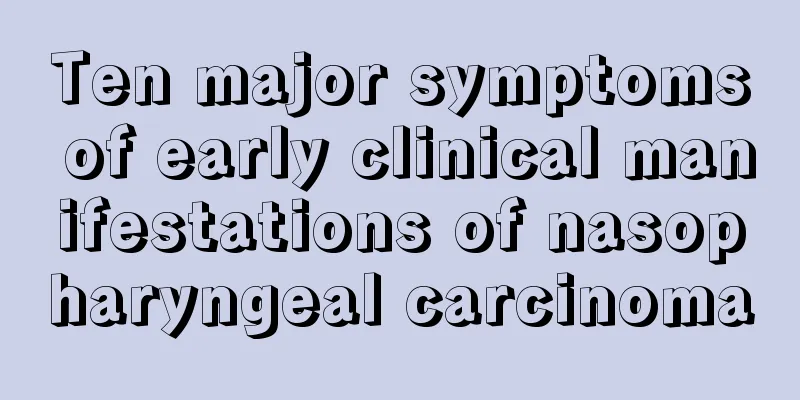Ten major symptoms of early clinical manifestations of nasopharyngeal carcinoma

|
Nasopharyngeal carcinoma refers to a malignant tumor that occurs in the nasopharyngeal mucosa. Most of the patients are middle-aged, but some are teenagers. Many nasopharyngeal carcinoma patients do not know that they have nasopharyngeal carcinoma in the early stage. Are the early symptoms of nasopharyngeal carcinoma really that difficult to detect? Let's mainly introduce the early clinical manifestations of nasopharyngeal carcinoma: Refers to numbness of the facial skin, clinical examination shows decreased or absent pain and touch sensation. Tumor invasion of the cavernous sinus often causes damage to the first or second branch of the trigeminal nerve. Tumor invasion of the anterior area of the styloid process of the foramen ovale often causes numbness or paresthesia of the skin in the anterior part of the auricle, temporal region, cheek, lower lip and chin. Numbness of the facial skin accounts for 10% to 27.9%. Nasopharyngeal carcinoma is prone to cervical lymph node metastasis, with metastasis occurring in approximately 60.3% to 86.1%, half of which are bilateral metastases. Cervical lymph node metastasis is often the first symptom of nasopharyngeal carcinoma (23.9% to 75%). In a small number of patients, nasopharyngeal examinations fail to reveal the primary lesion, and cervical lymph node metastasis is the only clinical manifestation, which may be related to the small size of the primary lesion of nasopharyngeal carcinoma and its extension into the submucosal tissue. When nasopharyngeal carcinoma occurs in the lateral fossa of the nasopharynx or the opening of the Eustachian tube, the tumor compresses the Eustachian tube and may cause unilateral tinnitus or hearing loss, a feeling of blockage in the ear, etc., which can be easily misdiagnosed as secretory otitis media. Hearing loss and a feeling of blockage in the ear are early symptoms of nasopharyngeal carcinoma. In the early stage, there may be bleeding symptoms, such as blood in the sputum after nasal suction, or blood in the mucus when blowing the nose. In the early stage, there is only a small amount of blood in the sputum or mucus, which may appear or disappear. In the late stage, there may be more bleeding and nosebleeds. Headache is a common symptom, accounting for 68.6%, which can be the first symptom or the only symptom. In the early stage, the headache is intermittent and has no fixed location, while in the late stage, it is a continuous migraine with a fixed location. The tumor invades the abducens nerve, which often causes double vision when looking outward. The invasion of the trochlear nerve often causes inward strabismus and diplopia, which accounts for 6.2% to 19% of cases and is often damaged at the same time as the trigeminal nerve. After the tumor blocks the nostrils, nasal congestion may occur. When the tumor is small, the nasal congestion is mild. As the tumor grows, the nasal congestion becomes more severe, mostly unilateral. If the tumor blocks both sides, bilateral nasal congestion may occur. Direct invasion of nasopharyngeal carcinoma or lymph node metastasis to the posterior styloid process or hypoglossal canal may invade the hypoglossal nerve, causing the tongue to deviate to the affected side and accompanied by atrophy of the tongue muscles on the affected side. The distant metastasis rate of NPC is about 4.8% to 27%, and distant metastasis is one of the main reasons for the failure of NPC treatment. Common metastatic sites are bones, lungs, liver and other organs, and simultaneous metastasis is common. It is very rare as the first symptom of nasopharyngeal carcinoma and is related to nasopharyngeal carcinoma invading the sphenoid sinus and pituitary gland. The above are the ten symptoms of early clinical manifestations of nasopharyngeal carcinoma. Experts suggest: If you have symptoms of disease, do not delay diagnosis and go to a regular hospital for treatment in time to avoid delaying the disease and causing serious consequences. This article is for reference only. If you have other questions, please consult our online experts or call for consultation. Nasopharyngeal cancer http://www..com.cn/zhongliu/bya/ |
<<: What are the common symptoms of ovarian cancer
>>: Some tips on preventing nasopharyngeal cancer
Recommend
Mugwort foot bath time
Soaking feet with mugwort is a hobby that many pe...
Can gastroscopy be performed for gastric bleeding?
Gastroscopy is an important means of checking sto...
Inheritance of skin color
If you observe carefully everyone in daily life, ...
After doing this, the woman only wanted a divorce
Young people nowadays get divorced easily. Some f...
How to reduce fever in adults the fastest
When a child at home has a fever, the whole famil...
How can women prevent the occurrence of lung cancer? Things you must know to prevent lung cancer in autumn and winter
Friends who know something about lung cancer shou...
What are the early symptoms of polyp-type endometrial cancer? If you have these symptoms, you need to pay attention
There are three main typical early symptoms of po...
What is the reason for the itchy and watery ears
If your ears are running and itchy, you should be...
Complete list of tongue cancer treatment methods
Cancer has taken many lives and is a disease that...
What are the early symptoms of lung cancer? There are four types
Everyone knows that when a disease is diagnosed, ...
Can nasopharyngeal cancer be cured? How to take care of it in daily life
Nasopharyngeal carcinoma is one of the most commo...
What kind of plaster should be applied for lumbar disc herniation
Generally speaking, when faced with diseases such...
How many times a day should you urinate to be considered normal
I believe everyone knows the importance of urinat...
How to gain weight if you are thin
In our lives, there is always a type of people th...
Hepatic artery angiography helps diagnose early liver cancer
Hepatic artery angiography is the most sensitive ...









